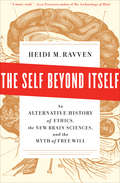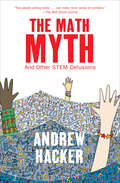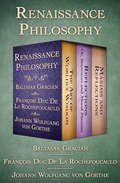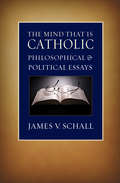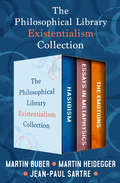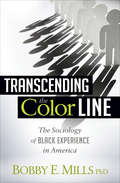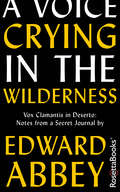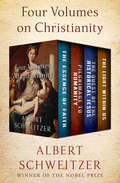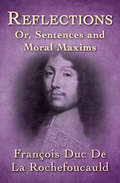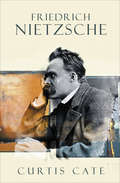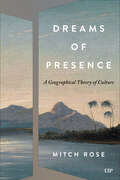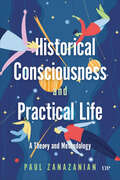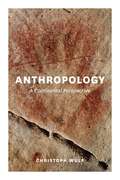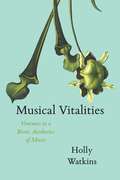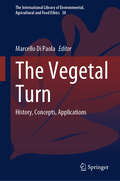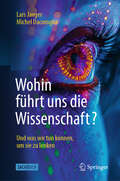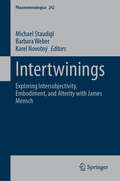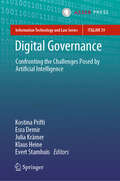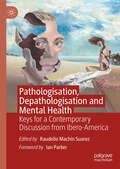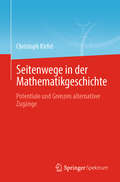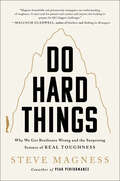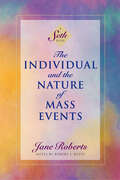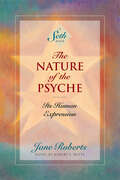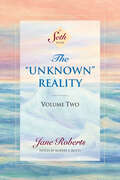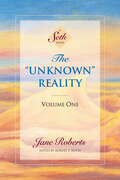- Table View
- List View
The Self Beyond Itself: An Alternative History of Ethics, the New Brain Sciences, and the Myth of Free Will
by Heidi M. Ravven&“Intertwines history, philosophy, and science . . . A powerful challenge to conventional notions of individual responsibility&” (Publishers Weekly). Few concepts are more unshakable in our culture than free will, the idea that individuals are fundamentally in control of the decisions they make, good or bad. And yet the latest research about how the brain functions seems to point in the opposite direction . . . In a work of breathtaking intellectual sweep and erudition, Heidi M. Ravven offers a riveting and accessible review of cutting-edge neuroscientific research into the brain&’s capacity for decision-making—from &“mirror&” neurons and &“self-mapping&” to surprising new understandings of group psychology. The Self Beyond Itself also introduces readers to a rich, alternative philosophical tradition of ethics, rooted in the writing of Baruch Spinoza, that finds uncanny confirmation in modern science. Illustrating the results of today&’s research with real-life examples, taking readers from elementary school classrooms to Nazi concentration camps, Ravven demonstrates that it is possible to build a theory of ethics that doesn&’t rely on free will yet still holds both individuals and groups responsible for the decisions that help create a good society. The Self Beyond Itself is that rare book that injects new ideas into an old debate—and &“an important contribution to the development of our thinking about morality&” (Washington Independent Review of Books). &“An intellectual hand-grenade . . . A magisterial survey of how contemporary neuroscience supports a vision of human morality which puts it squarely on the same plane as other natural phenomena.&” —William D. Casebeer, author of Natural Ethical Facts
The Math Myth: And Other STEM Delusions
by Andrew HackerA New York Times–bestselling author looks at mathematics education in America—when it&’s worthwhile, and when it&’s not. Why do we inflict a full menu of mathematics—algebra, geometry, trigonometry, even calculus—on all young Americans, regardless of their interests or aptitudes? While Andrew Hacker has been a professor of mathematics himself, and extols the glories of the subject, he also questions some widely held assumptions in this thought-provoking and practical-minded book. Does advanced math really broaden our minds? Is mastery of azimuths and asymptotes needed for success in most jobs? Should the entire Common Core syllabus be required of every student? Hacker worries that our nation&’s current frenzied emphasis on STEM is diverting attention from other pursuits and even subverting the spirit of the country. Here, he shows how mandating math for everyone prevents other talents from being developed and acts as an irrational barrier to graduation and careers. He proposes alternatives, including teaching facility with figures, quantitative reasoning, and understanding statistics. Expanding upon the author&’s viral New York Times op-ed, The Math Myth is sure to spark a heated and needed national conversation—not just about mathematics but about the kind of people and society we want to be. &“Hacker&’s accessible arguments offer plenty to think about and should serve as a clarion call to students, parents, and educators who decry the one-size-fits-all approach to schooling.&” —Publishers Weekly, starred review
Renaissance Philosophy: The Art of Worldly Wisdom; Reflections: Or, Sentences and Moral Maxims; and Maxims and Reflections
by Baltasar Gracián Johann Wolfgang von Goethe François Duc De La RochefoucauldWisdom for today&’s world from three great thinkers of the Renaissance era. This collection of three philosophical works by Renaissance men offers timeless advice on how to prosper and live morally in business, romance, religion, and society. Although written in the Renaissance era, these guides still resonate today and are collected here for easy reference. In The Art of Worldly Wisdom, Baltasar Gracián advises people of all walks of life how to approach political, professional, and personal situations in a dog-eat-dog world. Comprised of three hundred pithy aphorisms, this influential work of philosophy offers thought-provoking and accessible advice. Some subjects include &“Never Compete,&” &“The Art of Letting Things Alone,&” and &“Anticipate Injuries and Turn Them into Favours.&” Reflections; or Sentences and Moral Maxims by François de La Rochefoucauld offers hundreds of brief, brutally honest observations of humankind and its self-serving nature. The perfect read for any realist—or anyone with the desire to evaluate their moral standing—this edition includes three supplements with additional maxims and essays. In Maxims and Reflections, Johann Wolfgang von Goethe takes a detour from his usual literary endeavors and offers snippets of his musings on life, literature, science, nature, politics, and the human condition. Essential for fans of Goethe&’s works, it provides unique insight into the mind of the last true Renaissance man. This ebook has been professionally proofread to ensure accuracy and readability on all devices.
The Mind That Is Catholic: Philosophical & Political Essays
by James V. SchallIn this wide-ranging collection of philosophical essays, the acclaimed Catholic intellectual presents his vision of Catholic thought applied in the world. In The Mind That Is Catholic, political philosopher and Catholic intellectual James V. Schall presents a retrospective collection of his academic and literary essays written in the past fifty years. In these essays, exploring topics from war to friendship, philosophy, politics, and everyday living, Schall exemplifies the Catholic mind at its best. According to Schall, the Catholic mind seeks to recognize a consistent and coherent relation between the solid things of reason and the definite facts of revelation. It seeks to understand how they belong together, each profiting from the other. It respects what can be known by faith alone, but does not exclude the intelligibility of what is revealed. In these contemplative and insightful essays, Schall shares a lifetime of study in political philosophy, a wide-ranging discipline and perhaps the most vital context in which reason and revelation meet. &“Father James V. Schall is one of the few renaissance men still among us. His knowledge of various areas of reality and human endeavor is encyclopedic.&” ―Kenneth Baker, S.J., editor, Homiletic & Pastoral Review
The Philosophical Library Existentialism Collection: Hasidism, Essays in Metaphysics, and The Emotions
by Martin Heidegger Martin Buber Jean-Paul SartreExplore the work of three great existential philosophers together in this collection. Hasidism: Zionist philosopher Martin Buber shares the results of forty years of study and introduces the philosophies of Hasidism to a Western audience. In this modern masterpiece, Buber interprets the ideas and motives that underlie the great Jewish religious movement of Hasidism and its creator, Baal Shem. Essays in Metaphysics: German philosopher Martin Heidegger presents two lectures in which he explores the nature of identity in the history of metaphysics. He offers illuminating insights on vital issues like technology, religion, language, history, and more. The Emotions: French philosopher Jean-Paul Sartre attempts to understand the role emotions play in the human psyche. Sartre analyzes fear, lust, anguish, and melancholy while asserting that human beings begin to develop emotional capabilities from a very early age, which helps them identify and understand the emotions&’ names and qualities later in life.
Transcending the Color Line: The Sociology of Black Experience in America
by Bobby E. MillsA moral and philosophical approach to the stubborn problem of racism. Transcending the Color Line by sociologist and professor Bobby E. Mills, PhD, represents a philosophical attempt to make sense out of American black collective experience. These essays do not reflect traditional sociological perspectives and methodological considerations. Instead, the query is: How do we live? And more importantly, what are we willing to sacrifice in order to live the way we say we want to live? In other words, this collection digs deeper into the moral and spiritual issues that lie beneath the more obvious sociological ones. Invariably the search for moral understanding and spiritual meaning is neither easy nor popular. Yet it is the abstract, empirical (amoral and apolitical) character of traditional sociology that has all but rendered it irrelevant to the resolution of contemporary social ills. The biased theoretical assumptions of the scientific method (i.e., abstract empiricism) are the social basis for the collective bias otherwise known as the illusion of value neutrality. This collective cultural bias is the social foundation for institutional racism, sexism, theological dogmatism (i.e., denominationalism), and above all, authoritarianism. Indeed, every &“ism&” is a schism, and schisms divide. Our either/or logic fosters cultural extremism rather than a universal perspective on humanity. By digging deep to the true source of our sociological and leadership issues, these essays not only call black and white individuals accountable to the dysfunction present in our shared social experience, but inspire all people to transcend the color line and become part of the solution.
A Voice Crying in the Wilderness: Vox Clamantis in Deserto: Notes from a Secret Journal
by Edward AbbeyThoughts on nature, politics, love, and much more—from the environmentalist and author of such classics as Desert Solitaire and The Monkey Wrench Gang. Finished just two weeks before his death, A Voice Crying in the Wilderness is a collection of Edward Abbey&’s observations, both bitingly witty and inspirational, on a wide range of topics—from philosophy and writing to music, money, sex, and sports. Abbey chose each passage himself from his own journals and previous writings—and warns us in his typical humorous style that some of the notes &“may be unconscious plagiarisms from the great and dead (never steal from the living and mediocre).&” Abbey&’s last wish was to be buried in an unmarked grave somewhere out in the vast desert he loved so much. This book is an enduring signal from that desert, through the words of one of the singular American thinkers of our times.
Four Volumes on Christianity: The Essence of Faith, Pilgrimage to Humanity, The Quest of the Historical Jesus, and The Light Within Us
by Albert SchweitzerFour of the Nobel Peace Prize–winning author&’s most influential, insightful, and inspiring works on theology and ethics in the modern world. Famous for founding the Albert Schweitzer Hospital in what is now the West African country of Gabon, Albert Schweitzer&’s ethical philosophy of &“Reverence for Life&” became one of the most influential ideas of the twentieth century. These four volumes chart the development of Schweitzer&’s philosophy from his student days to his career as a globally revered intellectual. The Essence of Faith: While studying for his PhD at the Sorbonne, Schweitzer developed his views on theology through an analysis of Immanuel Kant&’s philosophy of religion. In The Essence of Faith, Schweitzer explores Kantian ideas to arrive at an inspiring meditation on God, faith, and the limits of human understanding. Pilgrimage to Humanity: In Pilgrimage to Humanity, Schweitzer discusses his philosophy, his ministry in Africa, and his pursuit of world peace. He also explores the important contributions to civilization made by figures such as Johann Wolfgang von Goethe, J. S. Bach, and Jesus of Nazareth. The Quest of the Historical Jesus: In this landmark work of Biblical criticism, Schweitzer deconstructs the traditional myths of Jesus&’s life by offering rigorous textual analysis and historical evidence. By establishing the social and political climate of Jesus&’s time, Schweitzer not only dismantles the previously dominant images of Jesus, but also presents a compelling new theory of his own. The Light Within Us: In The Light Within Us, Schweitzer&’s longtime friend Richard Kik has compiled many of his most insightful and inspiring quotations. Drawn from his many writings, these quotations share Schweitzer&’s thoughts on service, gratitude, God, missionary work, and much more.
Reflections: Or, Sentences and Moral Maxims
by François Duc De La RochefoucauldWe all have strength enough to endure the misfortunes of others. This famed work by a noted French author of the Renaissance era, seventeenth-century nobleman François de La Rochefoucauld, offers hundreds of brief, brutally honest observations of humankind and its self-serving nature. The perfect read for any realist—or anyone with the desire to evaluate their moral standing—this edition includes three supplements with additional maxims and essays. This ebook has been professionally proofread to ensure accuracy and readability on all devices.
Friedrich Nietzsche: A Biography
by Curtis Cate&“An accessible, anecdotally rich&” biography of the profoundly influential 19th century philosopher, author of Beyond Good and Evil and The Will to Power (Kirkus Reviews). Friedrich Nietzsche was the most fearlessly provocative and original thinker in Western history. The protean diversity of his writings make him one of the most influential of modern philosophers, yet his often paradoxical statements can be properly understood only within the context of his restless, tragic life. Physically handicapped by weak eyesight, violent headaches and bouts of nausea, this Nietzsche made short shrift of self-pity and ostentatious displays of compassion. The son of a Lutheran clergyman, whom he adored, he became a fearless agnostic who proclaimed, in Thus Spake Zarathustra that &“God is dead!&” Curtis Cate&’s refreshingly accessible new biography brilliantly distills and clarifies Nietzsche&’s ideas and the reactions they elicited. This book explores the musical and philosophical influences that inspired his thought, the subtle workings of his creative process, and the acute physical suffering he combated from his adolescence until his final mental collapse of January 1889. Cutting through the academic jargon and clearing away the prejudices that have become associated with Nietzsche&’s name, Cate reveals a man whose ideas continue to have prophetic relevance and incredible vibrancy today.
Dreams of Presence: A Geographical Theory of Culture
by Mitch RoseThroughout the twentieth century, the question of culture was a central pillar of social scientific thought. Today, however, the concept has disappeared from the academic landscape. Despite pressing political debates about culture wars, identity politics, cultural appropriation, and nativism, the concept of culture is no longer seen as a credible explanatory tool. Dreams of Presence provides a novel theoretical approach to the question of culture and will be of use to geographers, anthropologists, sociologists, and social theorists grappling to understand why culture continues to be a dominant political force in our contemporary world. Drawing on Heidegger, Levinas, Derrida, and Žižek, Mitch Rose provides an existential, rather than sociological, account of culture, conceptualizing it as a refuge where subjects endeavour to establish ownership over a life that perpetually eludes them. The book argues that culture is a claim; not something subjects ever have but something they desire; not something properly present but a dream of presence: an imagination of identity we cultivate, care for, and materially build in order to assure ourselves that we are sovereign, self-standing beings.
Historical Consciousness and Practical Life: A Theory and Methodology
by Paul ZanazanianHistorical Consciousness and Practical Life introduces a novel approach to examining how people construct and employ historical knowledge in their daily lives. In viewing history as an embodied cultural practice that constitutes the background to our meaning-making, the book demonstrates how researchers and others can investigate the ways in which people make sense of time’s flow in their now-moment engagements with the world and use that information to position themselves regarding key social problems with historical roots. The book provides a glimpse at how humans enter historically embedded thinking problems, seeking to resolve them. Paul Zanazanian draws on a study of the community leaders of English-speaking Quebec to illustrate the practical life methodology’s workings. In looking at their different uses of history for strengthening their group’s vitality in the province, he identifies five key stances these leaders employ for positioning their sense of purpose and responsibility for securing English-speaking Quebec’s future. Ultimately, Historical Consciousness and Practical Life argues that community leaders who complicate and problematize their uses of history are the best positioned to make positive transformations for their group.
Anthropology: A Continental Perspective
by Christoph WulfOriginally published in German, Christoph Wulf’s Anthropology sets its sights on a topic as ambitious as its title suggests: anthropology itself. Arguing for an interdisciplinary and intercultural approach to anthropology that incorporates science, philosophy, history, and many other disciplines, Wulf examines—with breathtaking scope—all the ways that anthropology has been understood and practiced around the globe and through the years. Seeking a central way to understand anthropology in the midst of many different approaches to the discipline, Wulf concentrates on the human body. An emblem of society, culture, and time, the body is also the result of many mimetic processes—the active acquisition of cultural knowledge. By examining the role of the body in the performance of rituals, gestures, language, and other forms of imagination, he offers a bold new look at how culture is produced, handed down, and transformed. Drawing such examinations into a comprehensive and sophisticated assessment of the discipline as a whole, Anthropology looks squarely at the mystery of humankind and the ways we have attempted to understand it.
Musical Vitalities: Ventures in a Biotic Aesthetics of Music (New Material Histories of Music)
by Holly WatkinsDoes it make sense to refer to bird song—a complex vocalization, full of repetitive and transformative patterns that are carefully calculated to woo a mate—as art? What about a pack of wolves howling in unison or the cacophony made by an entire rain forest? Redefining music as “the art of possibly animate things,” Musical Vitalities charts a new path for music studies that blends musicological methods with perspectives drawn from the life sciences. In opposition to humanist approaches that insist on a separation between culture and nature—approaches that appear increasingly untenable in an era defined by human-generated climate change—Musical Vitalities treats music as one example of the cultural practices and biotic arts of the animal kingdom rather than as a phenomenon categorically distinct from nonhuman forms of sonic expression. The book challenges the human exceptionalism that has allowed musicologists to overlook music’s structural resemblances to the songs of nonhuman species, the intricacies of music’s physiological impact on listeners, and the many analogues between music’s formal processes and those of the dynamic natural world. Through close readings of Austro-German music and aesthetic writings that suggest wide-ranging analogies between music and nature, Musical Vitalities seeks to both rekindle the critical potential of nineteenth-century music and rejoin the humans at the center of the humanities with the nonhumans whose evolutionary endowments and planetary fates they share.
The Vegetal Turn: History, Concepts, Applications (The International Library of Environmental, Agricultural and Food Ethics #38)
by Marcello Di PaolaThis book charts the multidimensional course of what has come to be known as the “Vegetal Turn” in environmental humanities - a wave of theoretical and practical interest in the complexities and peculiarities of plant life and plant-human relations. The vegetal turn consists of increasingly sophisticated, inter- and trans-disciplinary, inter- and trans-cultural explorations of the multiple systems and networks of communication, intelligence, technical-operational capabilities, and relations articulated by and via plants - as well as the ethical, economic, cultural, and political dimensions of plant-human interactions and practices. The volume includes contributions from philosophy and the humanities more generally that explore and reflect on the history, prospects, and applications of four main themes that the Vegetal Turn has brought to general attention: the mind of plants, and what their peculiar mentality can tell us about mind more generally; plant personhood and/or moral standing, and the justifications and implications of attributions thereof; plant relationships with humans, plant-based human relationships, and the ethics of human practices with or regarding plants - from agriculture to the arts, from forest management to urban design ; as well as the rights and/or political representation of plant life and the other life-forms that depend on it, human as well as non-human, present and future.
Wohin führt uns die Wissenschaft?: Und was wir tun können, um sie zu lenken
by Lars Jaeger Michel DacorognaIn den letzten 60 Jahren hat sich die Welt radikal gewandelt, angetrieben von bahnbrechenden Fortschritten in Wissenschaft und Technologie. Von den 1960ern bis heute erlebten wir einen beispiellosen Anstieg unseres Wissens in Bereichen wie Physik, Chemie, Biologie, Medizin, Computerwissenschaften und virtuelle Realitäten. Dies führte zur Entwicklung von wegweisenden Technologien wie Personalcomputern, dem Internet, Multitasking-Handys und fortschrittlicher künstlicher Intelligenz. Die Wissenschaft wurde dezentralisiert, und globale Forschergruppen arbeiten an komplexen Problemen, die unser Leben exponentiell beeinflussen. Unsere Welt verändert sich nicht mehr durch Einzeltechnologien, sondern durch die gleichzeitige Entwicklung verschiedener Technologien innerhalb weniger Jahre. Trotz des Wohlstands brachten Wissenschaft und Technologie auch neue globale Risiken mit sich. Atomkraft für das Militär, aufkommende künstliche Intelligenz, genetische Veränderungen und die Kontrolle durch Technologieunternehmen sind Herausforderungen, die unsere Zukunft prägen. Insgesamt hat der Fortschritt der letzten 60 Jahre unsere Welt transformiert und uns vor Chancen und Herausforderungen gestellt, die eine sorgfältige und ethische Gestaltung unserer Zukunft erfordern.
Intertwinings: Exploring Intersubjectivity, Embodiment, and Alterity with James Mensch (Phaenomenologica #242)
by Barbara Weber Michael Staudigl Karel NovotnýThis anthology offers a comprehensive introduction to the contemporary phenomenologist James R. Mensch, exploring his oeuvre and thought. Mensch's extensive body of work spans several decades, often concretely engaging with three intersecting conditions of dialogue: Alterity, Intersubjectivity, and Embodiment. By intertwining these concepts, Mensch exposes the ever-threatening soliloquy of modern reason, calling upon us to deconstruct the conflation of human freedom with sovereignty that figures at the core of Western political thought and practice. The contributors to this book pick up these themes and explore the fragility and potentiality of our conceptions of discourse, dialogue, and the political. Moreover, and in applying Mensch's idea of a post-foundational phenomenology, this anthology honors Mensch's expansive work, which spans key thinkers such as Husserl, Levinas, Merleau-Ponty, and Patočka, and delves into subjects ranging from perception and time to ethics and ecology. The volume is meant for students and researchers and explores these three interwoven conditions in various ways.
Digital Governance: Confronting the Challenges Posed by Artificial Intelligence (Information Technology and Law Series #39)
by Klaus Heine Kostina Prifti Esra Demir Julia Krämer Evert StamhuisThis book explores the structure and frameworks of digital governance, focusing on various regulatory patterns, with the aim of tackling the disruptive impact of artificial intelligence (AI) technologies. Addressing the various challenges posed by AI technologies, this book explores potential avenues for crafting legal remedies and solutions, spanning liability of AI, platform governance, and the implications for data protection and privacy. The book is valuable for audiences with or without a technological background. Primarily, it targets academic scholars from a variety of disciplines, including law, ethics, sociology, political science, economics, computer science, and engineering. Particularly, academics interested in interdisciplinary and transdisciplinary studies would benefit from the mixture of disciplines in the book. The scholarly insights in this work are valuable also for policymakers and civil society, by providing potential guidance for effective AI regulation. Additionally, the book can be useful to private companies and organisations that are involved in designing AI applications, offering practical insights and guidance about the legal and societal implications of AI. Kostina Prifti, Esra Demir and Julia Krämer are PhD candidates at Erasmus School of Law, Rotterdam, the Netherlands. Klaus Heine is Professor of Law and Economics at Erasmus School of Law, Rotterdam, the Netherlands. Evert Stamhuis is Professor of Law and Innovation at Erasmus School of Law, Rotterdam, the Netherlands. Chapter 2, Chapter 6, Chapter 10, and Chapter 13 are available open access under a via link.springer.com.
Pathologisation, Depathologisation and Mental Health: Keys for a Contemporary Discussion from Ibero-America
by Raudelio Machin SuarezThis book examines the pathologisation and depathologisation of mental health in Ibero-América. It highlights the possibilities and the epistemic limits of the interpretative models of pathos that have legitimised mental health pathologies. Further, it proposes a rereading of psychopathology and analyses the clinical, philosophical, ontological, ethical, psychological and anthropological consequences of this. Across ten chapters it brings together academics from Latin America with colleagues from Europe, Asia and North America to address issues including stigma, aesthetics, childhood, gender, migration, political public or social networks and their relationship with mental health. Section 1 brings critical psychology into dialogue with psychiatry, sociology, philosophy and psychoanalysis to review the conceptual frameworks through which "pathology" has been understood in "psy" discourses. Section 2 presents a range of case studies that demonstrate the impact of debates around the pathologisation and de-pathologisation on mental health care in various populations across Latin American. It will offer fresh insights to practitioners, as well as to students and scholars working in the areas of mental health, critical psychology, medical sociology, Latin American studies, psychiatry and psychoanalysis.
Seitenwege in der Mathematikgeschichte: Potentiale und Grenzen alternativer Zugänge
by Christoph KirfelIn diesem Buch werden Methoden aus der Geschichte der Mathematik dargestellt, die nicht zu Standardmethoden geworden sind oder es gar bis in klassische Schulbücher geschafft haben. Diese alternativen Zugänge waren oftmals zum Zeitpunkt ihrer Entstehung aktuell und im Gespräch, haben dann aber gegenüber den heutigen Standardmethoden an Aufmerksamkeit verloren und sind schließlich in Vergessenheit geraten. Oftmals enthalten diese Methoden noch ein ungenutztes Potential: Es lohnt sich, sie weiterzuentwickeln und zu entdecken, wo genau sich ihre Grenzen befinden. Das Buch möchte insbesondere angehenden Lehrkräften einen Blick über die üblichen Lehrinhalte hinaus ermöglichen und inhaltliche Anregungen für die Arbeit mit interessierten und begabten Schülerinnen und Schülern liefern. Archimedes etwa entwickelte eine Methode zur Berechnung des Flächeninhaltes eines Parabelsegmentes, die gewissermaßen ein Stück der Integralrechnung vorwegnimmt. Archimedes' Methode entwickelte sich aber nicht zur Standardmethode, wie man sie in heutigen Lehrbüchern wiederfindet. Dort findet man stattdessen die Methoden, die von Newton und Leibnitz entworfen wurden. Dieses Buch entwickelt die Archimedische Methode weiter und zeigt ihr „Restpotential“ auf: Andere Kurven, nicht nur Parabeln, lassen sich ähnlich angreifen und es ist interessant und lehrreich zu sehen, wie weit sich Archimedes' Methode entwickeln lässt und wo sie dann letztlich an ihre Grenzen stößt.
Do Hard Things: Why We Get Resilience Wrong and the Surprising Science of Real Toughness
by Steve MagnessNational Bestseller"In Do Hard Things, Steve Magness beautifully and persuasively reimagines our understanding of toughness. This is a must-read for parents and coaches and anyone else looking to prepare for life's biggest challenges." -- Malcolm Gladwell, author of Outliers and Talking to Strangers and host of the Revisionist History podcastFrom beloved performance expert, executive coach, and coauthor of Peak Performance Steve Magness comes a radical rethinking of how we perceive toughness and what it means to achieve our high ambitions in the face of hard things.Toughness has long been held as the key to overcoming a challenge and achieving greatness, whether it is on the sports field, at a boardroom, or at the dining room table. Yet, the prevailing model has promoted a mentality based on fear, false bravado, and hiding any sign of weakness. In other words, the old model of toughness has failed us.Steve Magness, a performance scientist who coaches Olympic athletes, rebuilds our broken model of resilience with one grounded in the latest science and psychology. In Do Hard Things, Magness teaches us how we can work with our body – how experiencing discomfort, leaning in, paying attention, and creating space to take thoughtful action can be the true indications of cultivating inner strength. He offers four core pillars to cultivate such resilience: Pillar 1- Ditch the Façade, Embrace RealityPillar 2- Listen to Your BodyPillar 3- Respond, Instead of React Pillar 4- Transcend Discomfort Smart and wise all at once, Magness flips the script on what it means to be resilient. Drawing from mindfulness, military case studies, sports psychology, neuroscience, psychology, and philosophy, he provides a roadmap for navigating life’s challenges and achieving high performance that makes us happier, more successful, and, ultimately, better people.
The Individual and the Nature of Mass Events (A Seth Book)
by Jane RobertsFrom the Bestselling Author of Seth SpeaksSpeaking exclusively through Jane Roberts, Seth has repeatedly stressed the concept that we create our own reality according to our individual beliefs. But how do our realities merge and combine to form mass reactions such as the overthrow of governments, the birth of a new religion, wars, epidemics, earthquakes, and new periods of art, architecture, and technology?In this pioneering work, Seth explores the connection between personal beliefs and world events. He pinpoints the unconscious — and often negative — beliefs pervading science and religion, medicine and mythology, and offers thought-provoking reflections on Darwinism, Freudianism, religions, cults, and medical beliefs.With fascinating and inspiring implications, Seth asserts that the personal impulses we are often taught to see as dangerous, chaotic, or contradictory, are instead crucial to the best interests of the species and the natural world, for they lead us to live &“not only as loving caretakers but as partners with other species.&”&“Only people who trust their spontaneous impulses can be consciously wise enough to choose from a myriad of probable futures the most promising events….&” — Jane Roberts, Speaking for Seth
The Nature of the Psyche: Its Human Expression (A Seth Book)
by Jane RobertsSeth, speaking exclusively through Jane Roberts, reveals a startling new concept of self, answering questions about the secret language of love, human sexuality, the real origins and incredible powers of dreams, and how we choose our physical death — sometimes years in advance.For the first time, Seth explains:• Why love is the basic language from which all others spring• The bisexual nature of humanity and its biological and spiritual importance• The true basis of homosexuality and lesbianism — along with their private and social effects• The benefits of recalling our dreams and consciously participating in them• How dreams can prevent chronic illnesses by providing important therapeutic information• Simple exercises you can do to expand your awareness of the deeper portions of your psyche and stretch your abilities to their fullest potential.&“The psyche is a gestalt of aware energy in which your own identity resides, inviolate, yet ever-changing as you fulfill your potentials. You are your psyche&’s living expression, its human manifestation. Yet you allow yourselves often to become blind to brilliant aspects of your own existence.&” — Jane Roberts, Speaking for Seth
The Unknown Reality, Vol 2 (A Seth Book)
by Jane RobertsFrom the Bestselling Author of Seth SpeaksIn this second volume of The &“Unknown&” Reality, Seth radically expands our conceptions of &“self,&” by showing us that the human personality is literally infinite in its scope and potential. He discloses precisely how probable realities combine to create our waking lives, and how our &“higher selves&” make decisions regarding our everyday existence. In a far-reaching exploration of the dynamics of desire and free will, he asserts that each atom, molecule, and cell has its own consciousness and powers of choice. With humor and simple analogies, Seth leads us beyond our ordinary level of awareness into a spectacular discovery of the multidimensional nature of the self, including:• &“Consciousness units&” as the basis of our universe• The relevance of extrasensory perception in understanding our world• The worlds we visit in dreams and out-of-body states• Dreaming as a science to create present and future realities• &“Families of consciousness&” we choose to belong to• Practical methods for exploring your own &“unknown&” reality&“There is an &“unknown&” reality. I am part of it, and so are you . . . Each individual is a part of the unknown reality . . . To explore the unknown reality you must venture within your own psyche, travel inward through invisible roads as you journey outward on physical ones . . . I hope that [in this book] the reader can see the greater dimensions that touch ordinary living, and sense the psyche&’s greater magic.&” — Jane Roberts, Speaking for Seth
The Unknown Reality, Vol 1 (A Seth Book)
by Jane RobertsFrom the Bestselling Author of Seth SpeaksIn this mind-stretching journey into the very frontiers of consciousness, Seth reveals the multidimensional nature of the human soul. In Seth Speaks, Seth introduced the concept of &“probable realities,&” in which our idle daydreams and unfulfilled impulses do take place, in which all possible choices are fully experienced by other portions of the self. Now in this first volume of The &“Unknown&” Reality, Seth explains the dazzling labyrinths of unseen probabilities involved in any decision, and how our awareness of these can enrich the waking life we know. In a fascinating exploration of the cosmic web of our existence, Seth reveals:• The purpose of dreams, and how they are often fulfilled unconsciously• Misconceptions about death and the afterlife• How different probable realities intersect and influence one another• The relationship between physical health and inner reality• A series of exercises to help you discover the unknown portions of your greater identity&“The self is multidimensional when it is physically alive. It is a triumph of spiritual and psychological identity, ever choosing from a myriad of probable realities its own clear unassailable focus. When you don&’t realize this, then you project upon life after death all of the old misconceptions. . . . The fact is that in life you poise delicately and yet perfectly between realities, and after death you do the same.&” — Jane Roberts, Speaking for Seth
